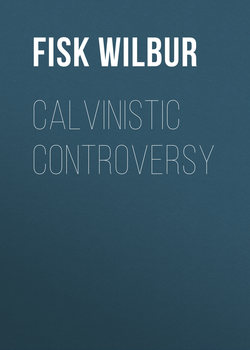Calvinistic Controversy

Реклама. ООО «ЛитРес», ИНН: 7719571260.
Оглавление
Fisk Wilbur. Calvinistic Controversy
ADVERTISEMENT
A DISCOURSE. ON. PREDESTINATION AND ELECTION
NUMBER I. REPLY TO THE CHRISTIAN SPECTATOR.3
NUMBER II. A PROPOSITION TO CALVINISTS
NUMBER III. INDEFINITENESS OF CALVINISM
NUMBER IV. SKETCH OF THE PAST CHANGES AND PRESENT STATE OF CALVINISM IN THIS COUNTRY
NUMBER V. SAME SUBJECT CONTINUED
NUMBER VI. PREDESTINATION
NUMBER VII. PREDESTINATION, CONTINUED
NUMBER VIII. MORAL AGENCY AND ACCOUNTABILITY
NUMBER IX. MORAL AGENCY AND ACCOUNTABILITY, CONTINUED
NUMBER X. MORAL AGENCY AS AFFECTED BY THE FALL, AND THE SUBSEQUENT PROVISIONS OF GRACE
NUMBER XI. SAME SUBJECT CONTINUED
NUMBER XII. OBJECTIONS TO GRACIOUS ABILITY ANSWERED
NUMBER XIII. REGENERATION
NUMBER XIV. REGENERATION, CONTINUED
NUMBER XV. REGENERATION, CONTINUED
Отрывок из книги
According as he hath chosen us in him before the foundation of the world, that we should be holy and without blame before him in love.
Having predestinated us unto the adoption of children, by Jesus Christ, to himself, according to the good pleasure of his will, Ephesians i, 4, 5.
.....
Several kinds of election are spoken of in the Scriptures. There is an election of individuals, to perform certain duties appointed by God: – thus Christ was God’s elect, for the redemption of the world; and Cyrus was elected by him to rebuild the temple. There is an election of whole communities and nations to the enjoyment of certain peculiar privileges, political and ecclesiastical, relating of course to this life: – thus Jacob and his descendants were God’s chosen people, to the enjoyment of religious and national privileges, from which Esau and his descendants, together with the whole Gentile world, were excluded; and thus, too, subsequently, the middle wall of partition, made by the former decree of election between Jew and Gentile, being broken down, the Gentiles became equal sharers with the Jews in the privileges of the new covenant, called the “election of grace.” This election is unconditional, and is believed to be the one spoken of in our text, and many other passages of Scripture. Of these, however, I shall speak more particularly in another place.
There is a third election – an election unto eternal life, and this is the one which has given rise to the great controversy in the Church. – Those who contend for predestination, as objected to by us, maintain that, “By the decree of God, for the manifestation of his glory, some men and angels are predestinated unto everlasting life, and others foreordained to everlasting death. Those of mankind that are predestinated unto life, God, before the foundation of the world, hath chosen in Christ, unto everlasting glory, without any foresight of faith or good works.” Others, and this also is our doctrine, hold that “God did decree from the beginning, to elect, or choose in Christ, all that should believe unto salvation, and this decree proceeds from his own goodness, and is not built on any goodness of the creature; and that God did from the beginning decree to reprobate all who should finally and obstinately continue in unbelief.” Thus it is seen, from the statement of the two doctrines, that ours is an election of character, and so far as it relates to individuals, it relates to them only as they are foreseen to possess that character; whereas the other relates directly to individuals, without any reference to character. It is an absolute act of sovereignty – God elects them for no other reason or condition than because he chooses. He makes no account of man’s agency or responsibility in this decree of election, but it precedes and is entirely independent of any knowledge of the character of the elect. Our views of election, on the contrary, make it conditionally dependent on the responsible agency of man. In the one case, the sinner is made to receive Christ, because he is elected; and in the other, he is elected, because he receives Christ. From this difference, too, proceed other differences. The Calvinistic election, to be consistent with itself, requires that, as the end is arbitrarily fixed, so the means must be also – hence the doctrines of irresistible grace, effectual calling, and infallible perseverance. Calvinian election, therefore, stands intimately allied to Calvinian predestination; and the whole forms a chain of doctrines differing materially from ours. And here we acknowledge we have a position to prove as well as our opponents. We assert that election to eternal life is conditional; they, that it is unconditional. We will first attempt to prove our position – then state and answer the arguments in favour of unconditional election – and finally, urge some objections against unconditional election and reprobation.
.....